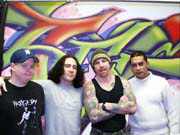The first legal tattoo parlor opened in Jersey City last month, after the City Council voted to allow tattooing in August. The law was changed after a former underground tattoo artist who was arrested for tattooing illegally brought the issue before the City Council. Body and Soul, located on First Street, opened in December Before last year, tattooing in Jersey City had been illegal since the 1930s.
The owner of Body and Soul, Guy Prandstatter, has been giving tattoos in a different shop since 1985. He owns another shop in Guttenberg, also called Body and Soul, where he has created body art for many Jersey City residents already.
The law was brought to attention last winter when local tattoo artist Denise de la Cerda, who had been quietly operating out of a Grove Street parlor since August 1998, was issued a summons after she began advertising tattooing on her storefront.
“She did it for years without a sign,” said Prandstatter. “And then one day she got very bold and put a tattoo sign out. And then bam, the guy came in and shut her down and then she just came back and started doing it again, and they stung her. They sent somebody in to get a tattoo and once she said ‘Hey, let’s go,’ they came in and arrested her. Now she got [charged] ’cause not only was she going against the ordinance, but this was after they closed her down. So she initiated the process of getting the ordinance to be changed.”
The law was amended in August, allowing tattooists to operate with a city-issued license. The license is based on state guidelines and costs $250 a year.
Although the law was changed, Cerda was unable to obtain a license because of her tattooing-related charge. “After that ordinance was passed,” said Prandstatter, “I learned that the health department was never going to give her a license…so I saw an opportunity.”
According to city ordinance 03-101, Tattooing is defined as “Any method of placing ink or other inert pigment into or under the skin or mucosa by the aid of needles or any other instrument used to puncture the skin, resulting in permanent coloration of the skin or mucosa. This includes all forms of permanent cosmetics.”
Safety a concern
Prandstatter feels legalized tattooing is beneficial, because regulation is important for customer safety.
“They want to make sure the public is protected, because in reality, anyone can open up a tattoo shop,” he said. “All you need is a couple of dollars. I’ve already had 10 to 15 people walk in off the street and say ‘Yeah, I just got out of jail and I need a job.’ I’m not going to hire somebody like that. Every person has to be insured, and every person has to have a complete portfolio.”
Licensed professionals are also required to follow certain guidelines regarding health and needle sterilization. “There’s probably a bunch more of these little, underground tattoo studios that are sometimes in a barber shop in the back room, or someplace underground somewhere,” said Prandstatter. “They weren’t allowed to be legal, and they’re still not, unless they get a license.”
Another artist
Prandstatter found the city to be particularly accepting of the sometimes controversial trade.
Hundreds of people have come through the door since they opened on Dec. 4. Prandstatter employs six tattoo artists and three piercers, each with years of experience and a portfolio.
“We’ve done a lot of tattoos, a lot of small stuff,” said Prandstatter. “They’re all feeling it out, getting a sense of who’s who. I’m a tattoo artist myself, so I can distinguish between a good tattoo artist and a not so good tattoo artist. Being a tattooist myself, I’m not in a position where I have to hire just anybody.”
“I’ve done this before and in most towns in New Jersey they don’t want anything to do with it,” added Prandstatter, “They think tattoos are like porno, and any negative thing you can think of, it’s kind of lumped together and they don’t look at it as a viable art form. They look at us like some seedy lowlife people are going to bring Harley Davidsons in and drive through our town and rape our women. All this nonsense may have happened 100 years ago, but at this point, it’s just an art form and the recognition of that is a process.”
The local business community has been encouraging as well.
“I view tattooing as another artist opening up in the district,” said Don Smartt, President of the Historic Special Improvement District where Body and Soul is located. “I’ve seen his work. He’s got some very good ideas about what he intends to do for the community. He’s concerned with safety and cleanliness in the area. He’s a new business we welcome him.”
Like other artists, Prandstatter and his crew often hold shows where they display their work. “We do separate artwork that’s kind of tattoo themed,” he said. “Artwork that’s in the style of a tattoo, or some photography, pictures of tattooed people, which are interesting to look at because they might be freaks or have a lot of piercings. There’s a lot of galleries and coffeehouses around here. We’re hoping that once things start cranking a little more we’ll start to do some gallery shows.”
Prandstatter previously displayed his work during a 2001 autumn show at Grounds Café, located on Jersey Avenue.
“I am a fan of tattoo art myself,” said Sean Patton, owner of Grounds. “I like the culture and the mystique around it. And the artwork. I’ve got several tattoos myself. It has a negative stigma, but I wanted to showcase it to show everybody that these people are legitimate artists that do a beautiful thing, and can be just as viable a form of art as a sculpture painting hanging in the Met.”
